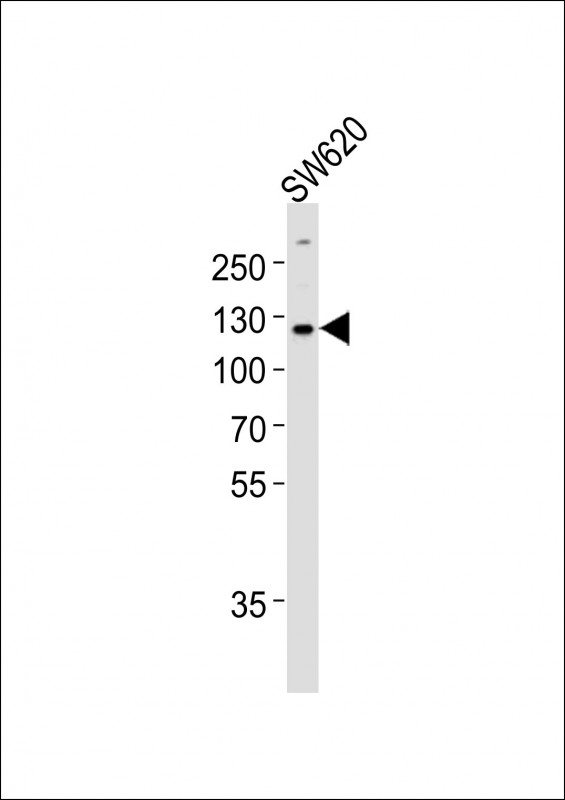WWP2 Antibody (N-term)
Purified Rabbit Polyclonal Antibody (Pab)
- SPECIFICATION
- CITATIONS
- PROTOCOLS
- BACKGROUND

Application
| WB, E |
|---|---|
| Primary Accession | O00308 |
| Reactivity | Human |
| Host | Rabbit |
| Clonality | polyclonal |
| Isotype | Rabbit IgG |
| Calculated MW | 98912 Da |
| Gene ID | 11060 |
|---|---|
| Other Names | NEDD4-like E3 ubiquitin-protein ligase WWP2, 632-, Atrophin-1-interacting protein 2, AIP2, WW domain-containing protein 2, WWP2 |
| Target/Specificity | This WWP2 antibody is generated from a rabbit immunized with a KLH conjugated synthetic peptide between 218-252 amino acids from the N-terminal region of human WWP2. |
| Dilution | WB~~1:1000 |
| Format | Purified polyclonal antibody supplied in PBS with 0.09% (W/V) sodium azide. This antibody is purified through a protein A column, followed by peptide affinity purification. |
| Storage | Maintain refrigerated at 2-8°C for up to 2 weeks. For long term storage store at -20°C in small aliquots to prevent freeze-thaw cycles. |
| Precautions | WWP2 Antibody (N-term) is for research use only and not for use in diagnostic or therapeutic procedures. |
| Name | WWP2 |
|---|---|
| Function | E3 ubiquitin-protein ligase which accepts ubiquitin from an E2 ubiquitin-conjugating enzyme in the form of a thioester and then directly transfers the ubiquitin to targeted substrates. Polyubiquitinates POU5F1 by 'Lys-63'-linked conjugation and promotes it to proteasomal degradation; in embryonic stem cells (ESCs) the ubiquitination is proposed to regulate POU5F1 protein level. Ubiquitinates EGR2 and promotes it to proteasomal degradation; in T- cells the ubiquitination inhibits activation-induced cell death. Ubiquitinates SLC11A2; the ubiquitination is enhanced by presence of NDFIP1 and NDFIP2. Ubiquitinates RPB1 and promotes it to proteasomal degradation. |
| Cellular Location | Nucleus |
| Tissue Location | Detected in heart, throughout the brain, placenta, lung, liver, muscle, kidney and pancreas. Also detected in spleen and peripheral blood leukocytes. |

Thousands of laboratories across the world have published research that depended on the performance of antibodies from Abcepta to advance their research. Check out links to articles that cite our products in major peer-reviewed journals, organized by research category.
info@abcepta.com, and receive a free "I Love Antibodies" mug.
Provided below are standard protocols that you may find useful for product applications.
Background
E3 ubiquitin-protein ligase which accepts ubiquitin from an E2 ubiquitin-conjugating enzyme in the form of a thioester and then directly transfers the ubiquitin to targeted substrates. Polyubiquitinates POU5F1 by 'Lys-63'-linked conjugation and promotes it to proteasomal degradation; in embryonic stem cells (ESCs) the ubiquitination is proposed to regulate POU5F1 protein level. Ubiquitinates EGR2 and promotes it to proteasomal degradation; in T-cells the ubiquitination inhibits activation- induced cell death. Ubiquitinates SLC11A2; the ubiquitination is enhanced by presence of NDFIP1 and NDFIP2. Ubiquitinates RPB1 and promotes it to proteasomal degradation.
References
Pirozzi G.,et al.J. Biol. Chem. 272:14611-14616(1997).
Jiang G.Y.,et al.Submitted (SEP-2011) to the EMBL/GenBank/DDBJ databases.
Ota T.,et al.Nat. Genet. 36:40-45(2004).
Martin J.,et al.Nature 432:988-994(2004).
Mural R.J.,et al.Submitted (JUL-2005) to the EMBL/GenBank/DDBJ databases.
If you have used an Abcepta product and would like to share how it has performed, please click on the "Submit Review" button and provide the requested information. Our staff will examine and post your review and contact you if needed.
If you have any additional inquiries please email technical services at tech@abcepta.com.













 Foundational characteristics of cancer include proliferation, angiogenesis, migration, evasion of apoptosis, and cellular immortality. Find key markers for these cellular processes and antibodies to detect them.
Foundational characteristics of cancer include proliferation, angiogenesis, migration, evasion of apoptosis, and cellular immortality. Find key markers for these cellular processes and antibodies to detect them. The SUMOplot™ Analysis Program predicts and scores sumoylation sites in your protein. SUMOylation is a post-translational modification involved in various cellular processes, such as nuclear-cytosolic transport, transcriptional regulation, apoptosis, protein stability, response to stress, and progression through the cell cycle.
The SUMOplot™ Analysis Program predicts and scores sumoylation sites in your protein. SUMOylation is a post-translational modification involved in various cellular processes, such as nuclear-cytosolic transport, transcriptional regulation, apoptosis, protein stability, response to stress, and progression through the cell cycle. The Autophagy Receptor Motif Plotter predicts and scores autophagy receptor binding sites in your protein. Identifying proteins connected to this pathway is critical to understanding the role of autophagy in physiological as well as pathological processes such as development, differentiation, neurodegenerative diseases, stress, infection, and cancer.
The Autophagy Receptor Motif Plotter predicts and scores autophagy receptor binding sites in your protein. Identifying proteins connected to this pathway is critical to understanding the role of autophagy in physiological as well as pathological processes such as development, differentiation, neurodegenerative diseases, stress, infection, and cancer.


